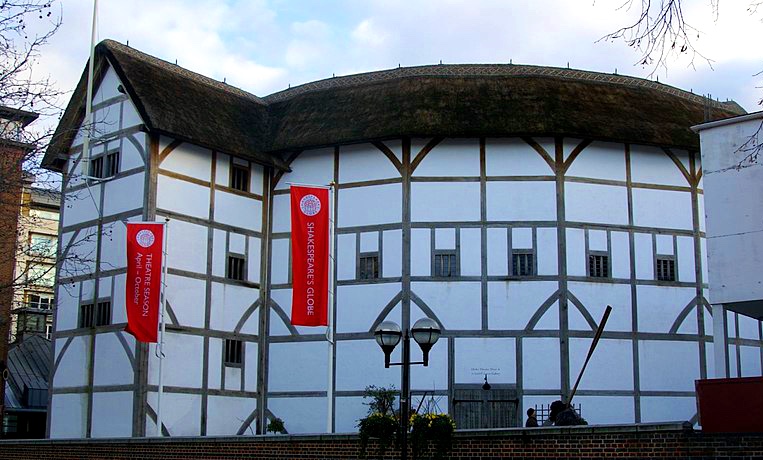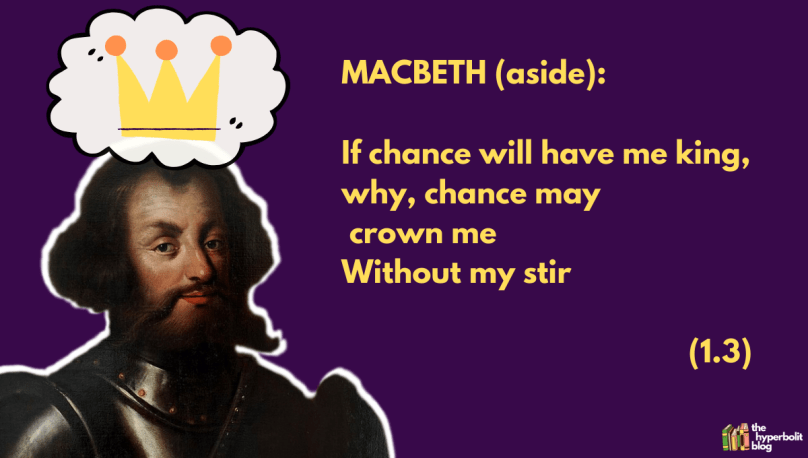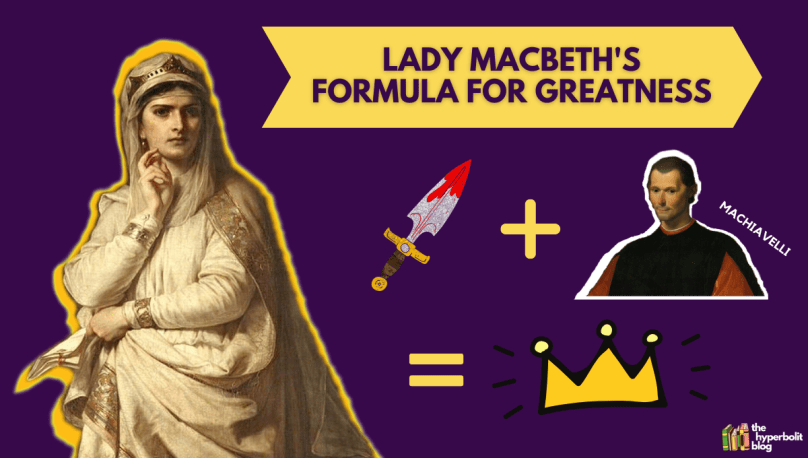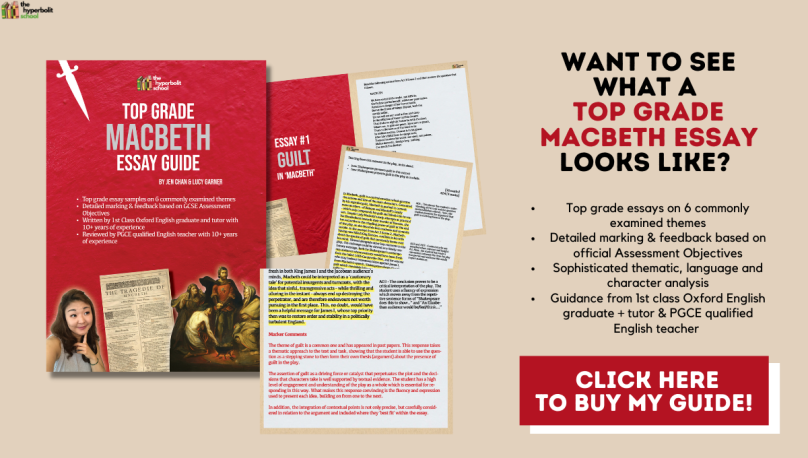(This post contains a detailed video on the topic)
Previously, I wrote about the primary causes of Macbeth’s fall. In that post, I left out ambition on purpose, largely because I wanted to save it up for a full-length post, which you’re now reading.
What is ‘ambition’?
The word ‘ambition’ is defined as ‘a strong desire to achieve success’.
Depending on one’s disposition and values, ambition could be the single most important quality in life, or an overrated, misery-inducing ticket to the modern rat race.
It is also a relative concept, the meaning of which differs substantially depending on the historical period in question. In the Renaissance worldview, there was a limit to which different people could achieve their ambition. Anyone could become wealthy by virtue of wits and hard work, but not everyone could be king.
Kingship was believed to be divinely preordained, i.e. if you don’t have royal blood, you can never – and should never want to – become king. The ideological framework for this was the so-called ‘divine right of kings’ theory, which was institutionalised by James VI of Scotland, who in 1603 became James I of England after Elizabeth I’s death.

The historical context of Macbeth: James VI and I, the Gunpowder Plot, and the ‘King’s Men’
Given the strong political connotations of ambition in Macbeth, its historical context is important for a deeper understanding of the play. Macbeth was first performed in 1606 – one year after the 1605 Gunpowder Plot, which was a failed attempt to assassinate James I and to blow up the Parliament.
Arriving hot on the heels of such a shattering incident, Macbeth and its clear parallels to the political happenings at the time would not have been lost on the King or Jacobean audiences.

On the most obvious level, the play cautions against overreaching ambition – especially the sort directed towards the throne, and in that sense, Macbeth doubles as a pro-establishment deterrent directed towards Guy Fawkes sympathisers or potential insurgents.
With James I as the patron of Shakespeare’s troupe – renamed from Lord Chamberlain’s Men to The King’s Men upon James’ ascension to the English throne, this interpretation does seem valid.

Scholarship and criticism
Indeed, it’s endorsed by prominent Shakespearean scholar Emma Smith, who writes in her accessible and illuminating monograph This is Shakespeare:
“For all [Shakespeare’s] fascination with regime change and weak kings, and the question of what makes a good ruler, Shakespeare is here the mouthpiece for Jacobean hereditary monarchy, for his new king James, and for the Stuart dynasty safely cushioned by two young princes. The sense of moral outrage and disturbance in Macbeth is Shakespeare’s invention, turning the brutal chaos of the sources into a story of rightful succession interrupted by the terrible ambitious agency of Macbeth.”
Had Macbeth been no more than a propagandistic vehicle, however, its relevance wouldn’t have lasted into the present day – almost 400 years after its first ever performance.
And one of the reasons for this is Shakespeare’s vivid portrayal of ambition and its impact on human psychology and behaviour, which remains a point of fascination for audiences across the globe (and beyond the Globe).

The “terrible ambitious agency” that Emma Smith speaks of is, in fact, the central issue that Macbeth grapples with in the play: the protagonist’s ambition is “terrible” because he pines after something that doesn’t naturally belong to him.
Ambition, like Renaissance subjects, had its time, place and limits, which implies that ambition of the transgressive sort can only be an unnatural, and therefore dangerous, desire, which – if entertained and pursued – will result in disastrous ends.
It’s important to consider, by the way, that Macbeth’s pursuit of kingship isn’t just about him – or an individual not knowing his rightful place in the world.
Macbeth is a metonymy of what could happen to the greater scheme of things when one person decides to step out of line and disrupt the natural order.
And clearly, what could happen in this case is chaos, guilt, death, carnage and remorse.
4 key ideas of ambition in Macbeth
In this post, then, let’s look at how Shakespeare presents ambition by close reading the following moments in the play:
-
Act 1 Scene 3: Ambition as a transgressive desire – “Against the use of nature”
-
Act 1 Scene 5: Ambition requires sacrifices of character – “Art not without ambition, but without the illness should attend it”
-
Act 1 Scene 7: Ambition can be irrational – “Vaulting ambition, which o’erleaps itself”
-
Act 3 Scene 1: Ambition begets ambition – “Upon my head they placed a fruitless crown”
…with video!
I also made a video to accompany this post, which you can watch if you’re into fun animations and, um, yours truly’s voiceover:
Act 1 Scene 3: Ambition as a transgressive desire – “Against the use of nature”

Early on in the play, Macbeth shows signs of unease about the prospect of becoming king. His rational self knows that “to be king/Stands not within the prospect of belief”, but to this statement, he adds “no more than to be Cawdor”.
This, however, is a false equivalence that Macbeth makes, and marks the first step towards his inevitable fall.
For if the divine rights of kings theory stipulates kingship as a matter of godly predetermination, then to be or not to be king is coded in one’s DNA – and it’s not in Macbeth’s.
Macbeth is fully aware of this, which is also why he’s agonised by the Three Witches’ prophecy. We see this in his aside in Act 1 Scene 3, when he states –
Two truths are told
As happy prologues to the swelling act
Of the imperial theme.
The “two truths” refer to Macbeth being Thane of Glamis (which he already is at the start of the play), and Thane of Cawdor (which he’s just found out about from Ross shortly before this speech).
Note the word “swelling” in “swelling act”: this word could either mean being “inflated with anger”, or “arrogant”, in the sense of swelling up with pride.
On a more basic level, though, it literally refers to the movement of “rising up”, but as we all know, what rises must come down. This, then, is a key moment of foreboding, which hints that for Macbeth, his “imperial theme” may only be a temporary stint, not a permanent station.
He goes on to say –
This supernatural soliciting
Cannot be ill, cannot be good. If ill,
Why hath it given me earnest of success
Commencing in a truth? I am Thane of Cawdor.
If good, why do I yield to that suggestion
Whose horrid image doth unfix my hair
And make my seated heart knock at my ribs
Against the use of nature? […]
The phrase “against the use of nature” hits at the heart of what’s wrong with Macbeth’s ambition. It is unnatural because it’s against divine law and providential will.
This is reinforced by the personification of the “horrid image doth unfix my hair/And make my seated heart knock at my ribs”, which suggests that by so much as toying around with the thought of becoming king, Macbeth’s external and internal, physiological and psychological selves are disturbed.
The vivid verbs are especially telling: what’s “fixed” becomes “unfixed” – the negative prefix “un-” implying a sort of undoing (and Macbeth will eventually be ‘undone’); and the heart that’s “seated” – originally settled in its place – becomes dislodged, as it seeks to venture beyond its domain.
But the heart can only serve where it naturally belongs in the body, and so this parallels Macbeth’s situation, which is only legitimate when he accepts his place in the social hierarchy, which unfortunately, is not the king’s throne.
Even though he’s stirred by tempting thoughts, Macbeth is still rational enough at this stage to realise that kingship can’t be forced.
The problem, though, is that he sees it as a possibility – albeit a remote one.
We know this when he says –
If chance will have me king, why, chance may
Crown me
Without my stir.
He seems to believe that fate is a determining factor in kingship, but as we will recall, kingship – at least according to the logic of Shakespeare’s dramatic cosmos – is derived from nowhere else but God, and is preordained before one’s birth.
Simply put, it’s not a matter of “chance”. In this sense, then, Macbeth’s first error is his misguidedness about the limitations of ambition, and the source of ultimate power.

Act 1 Scene 5: Ambition requires sacrifices of character – “Art not without ambition, but without the illness should attend it”

After Macbeth discusses the Three Witches’ prophecy with Banquo, he writes to Lady Macbeth and tells her about his supernatural encounter.
In his letter, Macbeth calls his wife “my dearest partner of greatness”, which tells us that their marriage is a close, tactical partnership with a mutual interest in power.
We know, then, that whatever ambition Macbeth may have, Lady Macbeth shares in it.
And sure enough, after she reads his letter, she reveals a side to Macbeth that we’ve not seen thus far in the play, which is rather different from the glowing characterisation we’ve seen in Act 1 Scene 2, where he’s referred to as “brave Macbeth”, “valiant cousin”, worthy gentleman” and “noble Macbeth”.
From his wife’s perspective, Macbeth is, in fact, not so valiant and brave, and while the thane may be ruthless on the battlefield (having “unseamed [Macdonwald] from the nave to the chaps”), he can be quite pussy-footed when it comes to making important decisions.
To Lady Macbeth, her husband’s problem is being too weighed down by matters of conscience, too troubled by wanting to be morally righteous (or at least appearing so). As such, he’s just not evil enough to get to the ‘next level’ –
Glamis thou art, and Cawdor; and shalt be
What thou art promised: yet do I fear thy nature;
It is too full o’ the milk of human kindness
To catch the nearest way: thou wouldst be great;
Art not without ambition, but without
The illness should attend it: what thou wouldst highly,
That wouldst thou holily; wouldst not play false,
And yet wouldst wrongly win: thou’ldst have, great Glamis,
That which cries ‘Thus thou must do’, if thou have it;
And that which rather thou dost fear to do
Than wishest should be undone.’ Hie thee hither,
That I may pour my spirits in thine ear;
And chastise with the valour of my tongue
All that impedes thee from the golden round,
Which fate and metaphysical aid doth seem
To have thee crown’d withal.
Notice the colons that appear in alternate lines as examples of midline caesura.
Apart from showing Lady Macbeth’s pensiveness in the moment, each colon pushes her argument about Macbeth’s nature towards an inevitable conclusion: as she goes from commenting on his nature as being “too full o’ the milk of human kindness”, to pointing out that he has the ambition “but without/The illness [that] should attend it”, and that he wants ‘greatness’ but doesn’t have the guts to pursue it, to finally pronouncing his “fear” as the quality that holds him back from achieving more.
All of this, of course, ends in her determination to “pour [her] spirits in thine ear”, which she’ll do in Act 1 Scene 7 to set off the chaos in the rest of the play.
The syntax here is telling. Note that the phrase “what thou wouldst highly” is reversed in the next line as “That wouldst thou holily”, which is an example of antimetabole (repetition of words in reversed order).
This pattern of reversal is also evident in the phrase that follows – “wouldst not play false,/And yet wouldst wrongly win”, with the phrases “play false” and “wrongly win” being chiasmic mirrors of each other.
What this double inversion suggests is the indecisiveness and hesitation of Macbeth’s mind, as he finds himself torn between two poles of tension, and his mind tied up in a knot when faced with big decisions. Indeed, this ‘should I/should I not’ mindset is what Lady Macbeth believes to be holding her husband back from pursuing greater ambitions.

Similarly, we see from the polyptoton of the word “do” (from “must do” to “to do” to “undone”) this implication of Macbeth as one who vacillates and lacks the will to commit.
He may say “Thus thou must do”, but once he’s done the act, he immediately regrets it and wishes he hadn’t done it at all – as in “thou dost fear to do/Than wishest should be undone”. These observations clearly show Lady Macbeth’s annoyance with what she believes is her husband’s weak-willed nature.
Most importantly, though, her soliloquy shows that she’s the ultimate pragmatist in the play, and that it is she who has the most sobering understanding of what ambition is.
Specifically, Lady Macbeth is fully aware that for Macbeth to be king, they must resort to illegitimate means, and that he can’t have his cake and eat it too.
She understands that the game of ambition is dirty, cut-throat (literally) and Machiavellian, so one can’t be spotless in the pursuit of power. It’s just the way it is.

She sees ambition as the only route to ‘greatness’, but also knows that embarking on it requires either natural cruelty, or grave sacrifices in character.
And for Macbeth, part of what makes him so tragic is that he seems to be a specimen of the latter.
Act 1 Scene 7: Ambition can be irrational – “Vaulting ambition, which o’erleaps itself”

As husband and wife and partners in crime, Macbeth and Lady Macbeth often echo each other’s words.
A good example of this comes in Act 1 Scene 7, before the evening feast in honour of Duncan’s visit, when Macbeth considers the motives behind committing regicide. At the start of his soliloquy, he echoes two important words that we’ve seen in Lady Macbeth’s Act 1 Scene 5 speech.
They are “done” and “catch”:
If it were done when ’tis done, then ’twere well
It were done quickly: if the assassination
Could trammel up the consequence, and catch
With his surcease success; that but this blow
Might be the be-all and the end-all here,
But here, upon this bank and shoal of time,
We’d jump the life to come.
While Lady Macbeth emphasises active agency with her “must do” and “to do”, Macbeth thrice-repeats the past participle “done”.
This validates Lady Macbeth’s observation of her husband’s wanting the result without wanting to be involved in the process. He’s not even committed the act, and yet he already wants it to be over, “done” and “done quickly”.
Note, too, Shakespeare’s use of passive voice – “If it were done” – instead of “I have done”, which suggests Macbeth’s desire to erase himself from the scene and excuse himself from the act. He eventually does say “I have done the deed” to Lady Macbeth after he kills Duncan in Act 2 Scene 2, but interestingly, the scene doesn’t take place on stage, so in that sense, Shakespeare doesn’t completely strip Macbeth of his nobility in the audience’s mind.
Contextually, it would have also been impolitic for Shakespeare to stage a regicide so blatantly after a failed assassination against James I.
The second word Macbeth echoes – “catch” – likewise avoids human agency.
Whereas Lady Macbeth’s comment is that he’s too kind “to catch the nearest way”, meaning ‘to strike at the closest opportunity’, Macbeth’s statement writes himself out of the ‘catching’, and instead personifies “assassination” as what “could trammel up the consequence, and catch/With [Duncan’s] surcease success”.
As Macbeth proceeds to ponder on the “judgment” and guilt that one would feel after committing a grave sin, he shifts from the evasiveness of passive voice to the more philosophising tone of a collective active voice with “we”, as in “we’d jump the life to come” and “we still have judgment here; that we but teach/Bloody instructions”.
Perhaps the idea is that we – the audience and the reader – are not exempt from his dangerous musings at this moment, and Macbeth’s indecision over whether to kill Duncan is not so different from our own hesitations in moments of overwhelming temptation.
In fact, the only occasions when we see the first person “I” in this soliloquy are when Macbeth makes his most innocent statements –
“I am his kinsman and his subject,/Strong both against the deed” (murder), and
“I have no spur/To prick the slides of my intent” (I have no reason to kill Duncan).
It is significant, then, that when he mentions “ambition” for the first time ever in this play, he immediately reverts to personifying mode, as he claims –
I have no spur
To prick the sides of my intent, but only
Vaulting ambition, which o’erleaps itself
And falls on the other.
Notice that he says “my intent”, but not “my ambition”. Ambition, in effect, has been personified as this wayward creature, rising and falling on its own accord as it “o’erleaps itself” with an agency of its own.
It’s hard not to see the word “vaulting” as a pun on the word “fault”, too, in which case this phrase would mean “sinful ambition”, which, in the context of this play, is apt.
By externalising ambition as a separate being, then, Macbeth seems to be arguing that whatever sin he next commits out of ambition is, ironically, out of his hands and control.
Act 3 Scene 1: Ambition begets ambition – “Upon my head they placed a fruitless crown”

Despite Macbeth’s clear lapse in judgment, there’s more than one reason to feel sorry for him (which is also why he’s a tragic hero, not a textbook villain; he retains a sense of nobility throughout the play).
One reason for our pathos is that he realises after gaining power that it doesn’t bring joy, nor does ambition offer peace of mind.
In fact, quite the contrary – the more power you hold, the greater the urge you feel to look over your shoulder.
This is the case with Macbeth and Banquo. After Macbeth becomes king, he finds out that his ambition extends beyond the realm of his rule: he can’t bear the thought of having Banquo’s sons succeed him.
Interestingly, he’s always known this to be the case after first hearing it from the Three Witches in Act 1 Scene 3, but this didn’t become an issue until he actually became king. This shows that ambition knows no bounds, and begets more ambition.
Indeed, moments before Macbeth orders Banquo’s murder, the newly minted king reflects on the flimsiness of his “fruitless crown” –
To be thus is nothing;
But to be safely thus.–Our fears in Banquo
Stick deep; and in his royalty of nature
Reigns that which would be fear’d: ’tis much he dares;
And, to that dauntless temper of his mind,
He hath a wisdom that doth guide his valour
To act in safety. There is none but he
Whose being I do fear: and, under him,
My Genius is rebuked; as, it is said,
Mark Antony’s was by Caesar. He chid the sisters
When first they put the name of king upon me,
And bade them speak to him: then prophet-like
They hail’d him father to a line of kings:
Upon my head they placed a fruitless crown,
And put a barren sceptre in my gripe,
Thence to be wrench’d with an unlineal hand,
No son of mine succeeding. If ‘t be so,
For Banquo’s issue have I filed my mind;
For them the gracious Duncan have I murder’d;
Put rancours in the vessel of my peace
Only for them; and mine eternal jewel
Given to the common enemy of man,
To make them kings, the seed of Banquo kings!
Rather than so, come fate into the list.
And champion me to the utterance! […]
The allusion to Mark Antony is at once ironic and foreboding.
First, it’s ironic for Macbeth to compare himself to Mark Antony, because unlike the latter, who was loyal to his leader Julius Caesar, Macbeth had betrayed King Duncan.
The reference to Octavius Caesar “rebuking” Mark Antony, however, foreshadows Macbeth’s own imminent loss of power. Octavius, also known as Augustus, was the adopted son of Julius Caesar, and as such, is more of a ‘rightful’ successor than Mark Antony (consider, too, that James I succeeded Elizabeth I not as a son, but as a relative).
It’s also telling that the Second Triumvirate, formed by Anthony, Augustus and Lepidus, was ultimately broken up and triggered a civil war partly because of the men’s competing ambitions, and partly because of Cleopatra’s influence over Mark Antony, which is not unlike Lady Macbeth’s sway over Macbeth.

This ominous allusion is followed by the imagery of infertility, as in the phrases “a fruitless crown”, “a barren sceptre”, and “an unlineal hand”. These descriptions are examples of hypallage, also known as transferred epithets, which basically means “an adjective which qualifies a noun other than the person / object it is actually describing”.
For example, a “crown” can’t literally be “fruitless” – instead, it is Macbeth, the person wearing the crown, who is “fruitless” because he has no son. Likewise, it isn’t his “sceptre” that’s “barren”, but rather, his own sterility (or Lady Macbeth’s infertility – we’re not sure).
Most ironically, the real “unlineal hand” isn’t so much Fleance’s (Banquo’s son) as it is his own, since Macbeth was the one who had “wrenched” King Duncan’s throne away, being an “unlineal” subject with no royal blood.
This imagery of lineage and succession is important, because it reminds us of the predetermined nature of rightful kingship, which is a station that one must be born into, and that no amount of ambition or scheming or even, valour, can grant.
Meanwhile, the forced juxtaposition of the hypallages draws attention to the unnaturalness of Macbeth as king, and to his status as an outsider who can only observe, but never be, a part of this “line of kings”.
This distinction, of course, prepares us for the final apparition that Hecate and the Three Witches conjures up in Act 4 Scene 1, when a procession of eight kings with Banquo’s ghost following haunts Macbeth in the form of a “horrible sight”, and accelerates his descent into murderous paranoia.




Hi, I was wondering if a Jacobean audience’s reaction to the play would go under context or would link with Shakespeare’s intentions.
Thanks.
LikeLike
Hi Hima! I would place that in the context section.
LikeLike